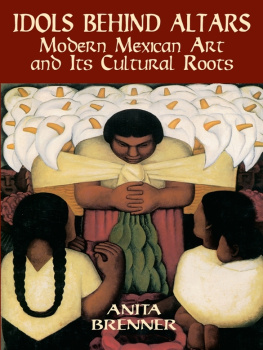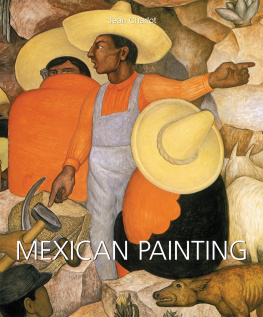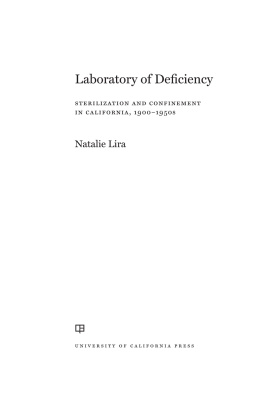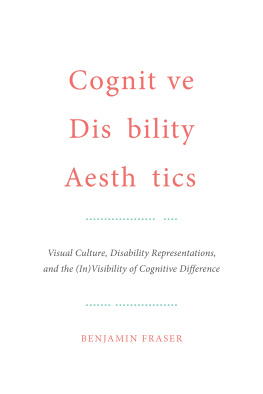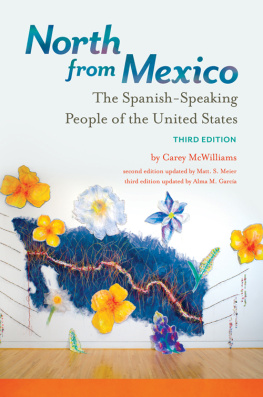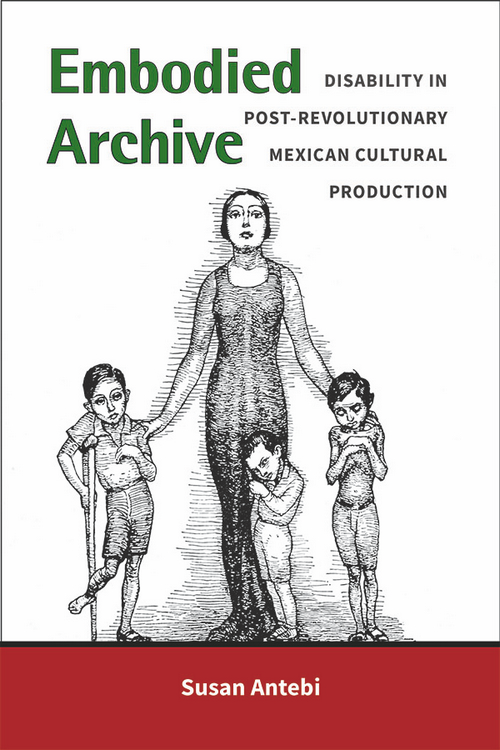
Page i Embodied Archive
Page ii Corporealities: Discourses of Disability
Series editors: David T. Mitchell and Sharon L. Snyder
Recent Titles
Embodied Archive: Disability in Post-Revolutionary Mexican Cultural Production
by Susan Antebi
Beholding Disability in Renaissance England
by Allison P. Hobgood
A History of Disability, New Edition
by Henri-Jacques Stiker
Vitality Politics: Health, Debility, and the Limits of Black Emancipation
by Stephen Knadler
Blindness Through the Looking Glass: The Performance of Blindness, Gender, and the Sensory Body
by Gili Hammer
HandiLand: The Crippest Place on Earth
by Elizabeth A. Wheeler
The Matter of Disability: Materiality, Biopolitics, Crip Affect
by David T. Mitchell, Susan Antebi, and Sharon L. Snyder, editors
Monstrous Kinds: Body, Space, and Narrative in Renaissance Representations of Disability
by Elizabeth B. Bearden
Autistic Disturbances: Theorizing Autism Poetics from the DSM to Robinson Crusoe
by Julia Miele Rodas
Foucault and Feminist Philosophy of Disability
by Shelley L. Tremain
Academic Ableism: Disability and Higher Education
by Jay Timothy Dolmage
Negotiating Disability: Disclosure and Higher Education
by Stephanie L. Kerschbaum, Laura T. Eisenman, and James M. Jones, editors
Portraits of Violence: War and the Aesthetics of Disfigurement
by Suzannah Biernoff
Bodies of Modernism: Physical Disability in Transatlantic Modernist Literature
by Maren Tova Linett
War on Autism: On the Cultural Logic of Normative Violence
by Anne McGuire
The Biopolitics of Disability: Neoliberalism, Ablenationalism, and Peripheral Embodiment
by David T. Mitchell with Sharon L. Snyder
Foucault and the Government of Disability, Enlarged and Revised Edition
by Shelley Tremain, editor
The Measure of Manliness: Disability and Masculinity in the Mid-Victorian Novel
by Karen Bourrier
American Lobotomy: A Rhetorical History
by Jenell Johnson
A complete list of titles in the series can be found at www.press.umich.edu
Page iii Embodied Archive
Disability in Post-Revolutionary Mexican Cultural Production
Susan Antebi
University of Michigan Press
Ann Arbor
Page iv Copyright 2021 by Susan Antebi
Some rights reserved

This work is licensed under a Creative Commons Attribution-NonCommercial-NoDerivatives 4.0 International License. Note to users: A Creative Commons license is only valid when it is applied by the person or entity that holds rights to the licensed work. Works may contain components (e.g., photographs, illustrations, or quotations) to which the rightsholder in the work cannot apply the license. It is ultimately your responsibility to independently evaluate the copyright status of any work or component part of a work you use, in light of your intended use. To view a copy of this license, visit http://creativecommons.org/licenses/by-nc-nd/4.0/
For questions or permissions, please contact um.press.perms@umich.edu
Published in the United States of America by the
University of Michigan Press
Manufactured in the United States of America
First published April 2021
A CIP catalog record for this book is available from the British Library.
Library of Congress Cataloging-in-Publication Data
Names: Antebi, Susan, author.
Title: Embodied archive : disability in post-revolutionary Mexican cultural production / Susan Antebi.
Description: Ann Arbor : University of Michigan Press, 2021. | Series: Corporealities: discourses of disability | Includes bibliographical references (pages 245260) and index.
Identifiers: LCCN 2020054687 (print) | LCCN 2020054688 (ebook) | ISBN 9780472038503 (paperback) | ISBN 9780472902422 (ebook other)
Subjects: LCSH: People with disabilities in mass media. | People with disabilitiesMexicoSocial conditions. | Race in mass media. | RacismMexico20th century. | MexicoSocial conditions20th century.
Classification: LCC HV1559.M4 A58 2021 (print) | LCC HV1559.M4 (ebook) | DDC 305.9/08097209041zdc23
LC record available at https://lccn.loc.gov/2020054687
LC ebook record available at https://lccn.loc.gov/2020054688
ISBN 978-0-472-90242-2 (OA e-book)
DOI: https://doi.org/10.3998/mpub.11644714
This open access version made available by Victoria College at the University of Toronto
Cover: Drawing illustrating the Special Education Service within the National Institute of Psychopedagogy, 1936. Instituto Nacional de Psicopedagoga. Secretara de Educacin Pblica, Departamento de Psicopedagoga y Mdico Escolar.
Cover description: Black and white drawing of a woman wearing a long, sleeveless dress, standing upright, her arms slightly outstretched. She rests each of her hands on the shoulders of two small boys, one of whom leans on a crutch. A third, smaller boy stands close to her legs. Above the illustration, to the left, the words Embodied Archive are printed in green, with the words Disability in Post-Revolutionary Mexican Cultural Production printed in black, slightly to the right. Below the illustration, the name Susan Antebi is printed in white on a red background.
Page v For Sergio and Camilo
Page vi Page vii Contents
Digital materials related to this title can be found on the Fulcrum platform via the following citable URL: https://doi.org/10.3998/mpub.11644714
Page viii Page ix Acknowledgments
It occurs to me in writing these pages that the genre of acknowledgments tends to create a strange taxonomy of persons, placing each in a singular category, when in fact there are many who fit into more than one role, as friends, colleagues, interlocutors, supporters, scholars of one or several disciplines, and those who hail from one or several locations. In ways far beyond this acknowledgment taxonomy, I am grateful to everyone who has knowingly or unknowingly shaped this book. Contingency, the idea that one thing, such as an event, a feeling, or a sense of identity, depends on outside factors or circumstances, appears frequently in the pages to come. Yet the gratitude I wish to express here is not contingent on the publication of my book; rather, this project offers me a serendipitous excuse to offer my thanks.
I have been fortunate to work with generous colleagues at the University of Toronto, including my many fellow travelers in the Department of Spanish and Portuguese and in the Latin American Studies Program, who have contributed to a vibrant academic environment. I especially wish to thank Rosa Sarabia, Eva-Lynn Jagoe, Nstor Rodrguez, Victor Rivas, Sanda Munjic, Robert Davidson, Stephen Rupp, Yolanda Iglesias, Ricardo Sternberg, Josiah Blackmore, Mariana Mota Prado, Kevin Coleman, Anne-Emanuelle Birn, Luis van Isschot, Melanie Newton, Donald Kingsbury, Bernardo Garca Domnguez, and Juan Marsiaj. Portions of this research were presented in earlier forms to colleagues in disability studies, and I am particularly grateful to Tanya Titchkosky, Rod Michalko, and Anne McGuire for facilitating space and offering knowledgeable feedback on my work in progress. I also thank my colleagues in the Racial Technologies Working Group, Tamara Walker, Valentina Napolitano, Luisa Schwartzman, Antonio Torres-Ruiz, Nae Hanashiro vila, and Ted Sammons, who provided invaluable insight Page x on an earlier draft of chapter 1, as well as a welcoming space in which to share work in progress. Thanks are due as well to participants in the Tepoztln Institute for Transnational History of the Americas, of 2016, who productively engaged with an earlier version of a portion of the manuscript. I am immensely grateful to Salvador Alanis and Ximena Berecochea, codirectors of the Toronto-based Institute for Creative Exchange (ICE), for their innovative work in the creation and facilitation of artistic and cultural initiatives, and particularly for the opportunity to participate along with Mario Bellatin and Daniel Canty in the workshop Art and Orthopedics, which allowed me to work through some of the concepts presented in this book. I extend my appreciation to Hctor Domnguez Ruvalcaba, Ana Ugarte, Kristina Mitchell, Carolyn Fornoff, Ryan Prout, and their colleagues for additional opportunities to present and improve on versions of this work in various venues over a number of years.
Next page

